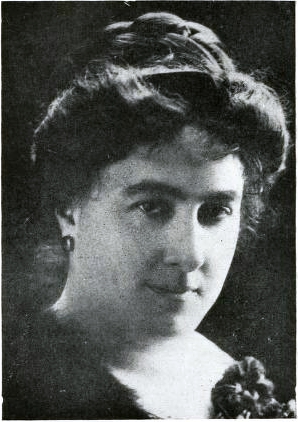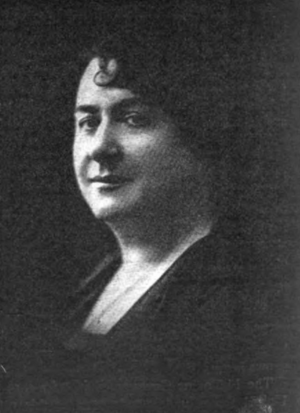Paulina Luisi facts for kids
Quick facts for kids
Paulina Luisi
|
|
|---|---|
 |
|
| Born |
Paulina Luisi Janicki
1875 Colón Department, Entre Ríos, Argentina
|
| Died | 1950 (aged 74–75) |
| Occupation | Physician, teacher, activist |
Paulina Luisi (1875–1950) was a leader of the feminist movement in the country of Uruguay. In 1909, she became the first Uruguayan woman to earn a medical degree. She represented Uruguay in international women's conferences and traveled throughout Latin America and Europe. She was also the first Latin American woman to participate in the League of Nations and became one its most influential early activists. Her work has had a lasting effect on women of the Americas.
Contents
Biographical Information
Paulina Luisi was born in Argentina in 1875. Her mother, Maria Teresa Josefina Janicki, was of Polish descent and her father, Angel Luisi, was believed to be of Italian ancestry. Shortly after her birth, the family moved to Uruguay. Luisi also had two sisters, Clotilde Luisi, who was the first female lawyer in Uruguay, and Luisa Luisi, who was a famous poet.
The primary figures whom Luisi drew inspiration from and who provided her with undivided support were her parents. Maria encouraged Luisi to pursue her dreams despite the social constraints placed on women in the early twentieth century. Her father, Angel, an educator and socialist, instilled in her “an uncontainable desire for justice and liberty.” Following her father, throughout her life, Luisi was a socialist interested in questions of moral reform.
Medical Education and Teaching
Luisi received a bachelor's degree in 1899 and graduated from the Medical School of the University of the Republic of Uruguay. In 1908 she became Uruguay's first female physician and surgeon. She became the head of the gynecology clinic of the Faculty of Medicine at the National University in Montevideo. In 1907 there were only four female doctors and three-hundred and five male doctors in Uruguay. As more women joined the medical field, the number of women physicians started to rise. Luisi wrote medical papers on topics ranging from prophylaxis of contiguous diseases, hygiene, eugenics, open air schools, hereditary qualities, and social diseases, to the mother's rights.
Feminist Influences
Josephine Butler, a famous 19th-century English moral reformer, had powerful influence on Luisi. Her fight against the Contagious Disease Act of 1864, and her founding of the International Abolitionist Federation in Geneva, Switzerland to curb the white slave trade served as a continual source of inspiration for Luisi.
Luisi’s feminist ideas built upon other movements occurring in the early twentieth century. While Luisi was still a student, Argentine liberal feminist Petrona Eyle wrote to her in her capacity as president of the Universitarias Argentinas (Argentine Association of University Women, affiliated with the American Association of University Women (AAUW)), recruiting her to join the organization. In a letter dated May 1, 1907, Eyle encouraged Luisi and her female colleagues in the university to form a Uruguayan branch of the Universitarias, stating that “although there aren’t many of you now, you will always be the nucleus around which others will come together.”
It appears that Luisi and others accepted this invitation and joined with their Argentine counterparts in 1907. Important also to Luisi’s insertion into Pan-American liberal feminist networks and to her propulsion to the leadership of Uruguayan liberal feminism was her participation in the Women's Congress (Congreso Femenino) held in Buenos Aires in 1910. There she became acquainted with prominent Argentine feminists such as Alicia Moreau de Justo and Cecilia Gierson Organized by the Universitarias, the conference brought together more than 200 women, representing Argentina, Uruguay, Peru, Paraguay, and Chile. It was likely at this conference that Luisi first came into contact with many of the leaders (or soon-to-be leaders) of liberal feminism in South America, and where she would establish ontacts and friendships that would endure for decades afterwards. Trips to Europe brought her into contact with women such as Ghenia Avril de Saint Croix, president of the moral unity committee of the International Council of Women, and Julie Siegfried, president of the French National Council of Women.
Feminist Activism in Uruguay and the Americas
Uruguayan Feminism
Prior to Luisi's feminist activism, there were no organized movements for women's rights in Uruguay, despite the country's progressive stance on social legislation in the early twentieth century. As a Uruguayan representative at the First Pan-American Scientific Congress meeting in 1915, Luisi helped found a Pan-American Women's Auxiliary, which advocated for "social and economic betterment " of women and children. After this experience, Luisi turned her attention to developing women’s organizations in her home country.
Luisi, together with Isabel Pinto de Vidal and Francisca Beretervide, founded the Consejo Nacional de Mujeres (CONAMU), a branch of the International Council of Women in Uruguay in 1916. Luisi became the founder and primary editor of the CONAMU bulletin Acción Femenina (Feminine Action). The bulletin primarily focused on topics concerning women's values and equality. In the 1917 edition, Luisi published her definition of feminism stating the term implies "…that woman is something more than material created to serve and obey man like a slave, that she is more than a machine to produce children and care for the home; that women have feelings and intellect; that it is their mission to perpetuate the species and this must be done with a mind and a heart prepared to be a mother and an educator; that she must be the man’s partner and counselor not his slave." The CONAMU served as a place for women to empower each other, with Luisi at the forefront, and focused on social problems including women’s social welfare and education, working women’s conditions, and equal moral standards.
Luisi was a strong advocate for working women as well. She created the two first female trade unions that existed in Uruguay – Unión de Telefonistas (Telephone Operators Union) and the Costureras de sastrerías (Seamstresses from Tailor's Shops). Luisi worked with the Telephone Workers Union to get better work conditions, and the women went from having to operate one hundred phones to eighty thanks to Luisi's involvement. Uruguayans warmed to the idea of women’s suffrage in the 1910s, and in 1919 Luisi founded the Alianza de Mujeres para los Derechos Femeninos (Women Alliance for Women's Rights), which was affiliated with the International Woman Suffrage Alliance. The Alianza pressured elected officials to enact women’s political rights. The Alianza worked closely with deputy Alfeo Brum to get congress to pass a bill authorizing women’s vote at the municipal level, so that women could fulfill their "legitimate social duty of rendering service to the different domains of public welfare." The bill did not pass. With suffrage stalled, four years after its creation the Alianza expanded its agenda to include women’s economic and civil rights.
Pan-American Feminism
In addition to fighting for women’s rights in Uruguay, Luisi aspired to create a Pan-American feminist movement that would benefit countries in the Americas. She also wanted to achieve equality globally. Luisi traveled to the United States with the hope of having American feminists help develop Pan-American feminism, but she emerged disappointed in American women’s disdain for South American feminists. It wasn't until World War II broke out that Luisi once again advocated for "sisterhood" between the US and Latin American feminists. Luisi's activism was internationally recognized and popular in Latin America. In 1947, the Primer Congreso Interamericano de Mujeres (First Inter-American Women’s Conference) in Guatemala paid tribute to Luisi, recognizing her as the mother of inter-American feminism.
Radio Femenina
Paulina Luisi's activism was also prevalent in public radio stations in Latin America. Radio Femenina, a radio station in Uruguay, was host to Luisi in the 1930s. On air, Luisi urged feminists to remain active because women were the only ones who could make a difference as mediators and peacemakers. Luisi was very influential as the radio allowed her to speak her mind freely and reach places beyond Argentina and Uruguay. Luisi's radio personality placed her in a position of authority as an older wise women among the feminists. A milestone within her radio involvement occurred in her later years when she encouraged women to vote in the 1942 elections in Uruguay to prove that women were worthy of their citizenship. In her older age in the 1940s, Luisi became known as La Abuela, the grandmother, a nickname that displayed ideals of motherhood attached to feminism.
See also
 In Spanish: Paulina Luisi para niños
In Spanish: Paulina Luisi para niños



